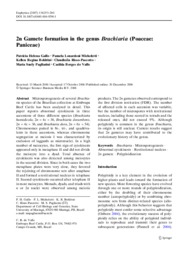2n Gamete formation in the genus Brachiaria (Poaceae: Paniceae).
2n Gamete formation in the genus Brachiaria (Poaceae: Paniceae).
Author(s): GALLO, P. H; MICHELETTI, P. L.; BOLDRINI, K. R.; RISSO-PASCOLOTTO, C.; PAGLIARINI, M. S.; VALLE, C. B. do
Summary: Microsporogenesis of several Brachiaria species of the Brazilian collection at Embrapa Beef Cattle has been analyzed in detail. This paper reports abnormal cytokinesis in three accessions of three different species (Brachiaria humidicola, 2n = 4x = 36, Brachiaria decumbens, 2n = 4x = 36, and Brachiaria dura, 2n = 6x = 54). Chromosomes paired in bi-, tri-, and quadrivalents in these accessions, whereas chromosome segregation at meiosis I was characterized by exclusion of laggards as micronuclei. In a high number of meiocytes, the first sign of cytokinesis appeared only in metaphase II and did not divide the meiocyte into a dyad. Total absence of cytokinesis was also detected among meiocytes in the second division. Since in both cases the two metaphase plates were very close, they favored the rejoining of chromosome sets after anaphase II and formed a restitutional nucleus in telophase II. Second cytokinesis occurred after telophase II in most meiocytes. Monads, dyads, and triads with n or 2n nuclei were observed among meiotic products. The 2n gametes observed correspond to the first division restitution (FDR). The number of affected cells in each accession was variable, but the number of microspores with restitutional nucleus, including those scored in tetrads and the released ones, did not exceed 9%. Although polyploidy is common in the genus Brachiaria, its origin is still unclear. Current results suggest that 2n gametes may have contributed to the evolutionary history of the genus.
Publication year: 2007
Types of publication: Journal article
Unit: Embrapa Beef Cattle
Keywords: Brachiaria Decumbens, Brachiaria Humidicola, Brachiaria dura, Braquiária, Brasil, Brazil, Campo Grande, Citogenética Vegetal, Feed crops, Feed grasses, Gramínea Forrageira, Mato Grosso do Sul, Melhoramento Genético Vegetal, Planta Forrageira, Poliploidia, cytogenetics, plant breeding, polyploidy
Observation
Some of Embrapa's publications are published as ePub files. To read them, use or download one of the following free software options to your computer or mobile device. Android: Google Play Books; IOS: iBooks; Windows and Linux: Calibre.
Access other publications
Access the Agricultural Research Database (BDPA) to consult Embrapa's full library collection and records.
Visit Embrapa Bookstore to purchase books and other publications sold by Embrapa.

